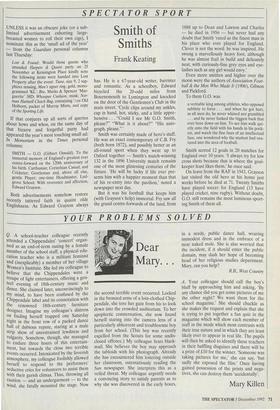SPECTATOR SPORT
Smith of Smiths
Frank Keating
UNLESS it was an obscure joke (or a sub- liminal advertisement exhorting large- breasted women to roll their own cigs), I nominate this as the 'small ad of the year' — from the Guardian personal columns last Thursday: Lost 8E Found: Would those guests who attended Harpers & Queen party on 25 November at Kensington Place kindly note the following items were handed into Lost Property after the event: Tiara, size 9, 2 sap- phires missing, Man's signet ring, gold, mono- grammed `KL'; Bra, Marks & Spencer 'Mar- guerite' 38D; Whoopee Cushion, mink; Nor- man Hamel! Clutch Bag, containing 'hoz Old Holborn, packet of Murray Mints, and copy of the Sporting Life.
If that conjures up all sorts of queries about hows and whos, on the same day of that bizarre and forgetful party had appeared the year's most touching small ad: In Memoriam in the Times personal columns:
SMITH — G.O. (Gilbert Oswald). To the immortal memory of England's greatest ever centre-forward on the 120th anniversary of his birth. Carthusian; Corinthian Casual, and Cricketer; Gentleman and, above all else, gentle Player; one-time Headmaster, Lud- grove School. With reverence and affection, Edward Grayson.
Both advertisements somehow restore recently tattered faith in quaint olde Englishness. As Edward Grayson always has. He is a 67-year-old writer, barrister and romantic. As a schoolboy, Edward bicycled the 20-odd miles from Bournemouth to Lymington and knocked on the door of the Gentlemen's Club in the main street. 'Cycle clips around my ankles, cap in hand, hot, sticky, and a little appre- hensive. . . "Could I see Mr G.O. Smith, please?" "What is it about?" "His auto- graph, please." ' Smith was certainly made of hero's stuff. He was an exact contemporary of C.B. Fry (both born 1872), and possibly better as an all-round sport when they went up to Oxford together — Smith's match-winning 132 in the 1896 University match remains one of the most glistening centuries of the fixture. 'He will be lucky if life ever pre- sents him with a happier moment than that of his re-entry into the pavilion,' noted a newspaper next day.
But it was his football that keeps him (with Grayson's help) immortal. Fry saw all the grand centre-forwards of the land, from 1888 up to Dean and Lawton and Charles — he died in 1956 — but never had any doubt that Smith 'rated as the finest man in his place who ever played for England. Clever is not the word: he was inspired. He swung a marvellously heavy foot, although he was almost frail in build and delicately neat, with curiously-fine grey eyes and eye- lashes such as any girl would envy.'
Even more smitten and higher over the moon were the authors of Association Foot- ball & the Men Who Made It (1906), Gibson and Pickford.
To them G.O. was
a veritable king among athletes, who opposed subtlety to force . . . and when he got hurt, as all men do, he never whined nor grumbled . . . and he never funked the biggest back that ever bore down on him. To see him walk qui- etly onto the field with his hands in his pock- ets, and watch the fine lines of an intellectual face, one wondered why the student had ven- tured into the area of football.
Smith scored 12 goals in 20 matches for England over 10 years. 'I always try for low cross shots because that is where the goal- keeper least likes them,' he once said.
On leave from the RAF in 1943, Grayson last visited the old hero at his home just weeks before he died at 71. Twenty Smiths have played soccer for England (13 have played cricket, nine rugby). Without doubt, G.O. still remains the most luminous sport- ing Smith of them all.










































































 Previous page
Previous page